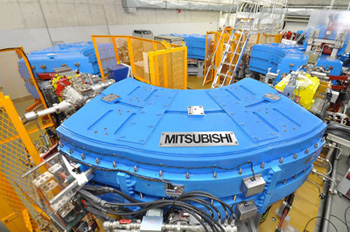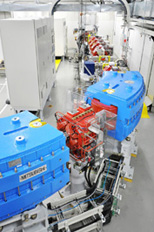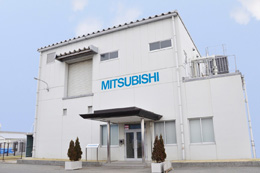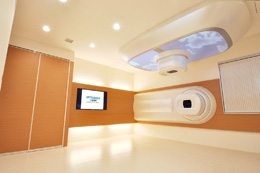News Release Archives
Note that the releases are accurate at the time of publication but may be subject to change without notice.
FOR IMMEDIATE RELEASE No. 2765
Mitsubishi Electric Begins Testing New Proton Therapy Technology
New technology aims to cut irradiation time by up to 75%
TOKYO, May 15, 2013 - Mitsubishi Electric Corporation (TOKYO: 6503) announced today that it has completed the construction of a new proton therapy system for cancer treatment at its Energy Systems Center in Kobe, Hyogo Prefecture. The company has started testing of the new technology including a high dose-rate beam delivery system which reduces the irradiation time to one fourth of the current level.

Mitsubishi Electric plans to perform the quality verification testing of this new system in collaboration with clinical institutions, and also utilize the preferred status granted as a member of the Kansai Innovation Comprehensive Global Strategic Special Zone in order to obtain early approval as a medical device.

Mitsubishi Electric plans to perform the quality verification testing of this new system in collaboration with clinical institutions, and also utilize the preferred status granted as a member of the Kansai Innovation Comprehensive Global Strategic Special Zone in order to obtain early approval as a medical device.
 |
 |
|
| New Proton Accelerator (Synchrotron) | Beam Line for Testing | |
Key Technologies to be Tested
| 1) | High dose-rate beam delivery system
|
|
| 2) | High-accuracy pencil beam scanning technology
|
|
| 3) | Universal nozzle for efficient operation
|
|
 |
 |
|
| Accelerator Test Facility | Test Facility Showroom | |
Accelerator Test Facility at the Energy Systems Center, Kobe
| Purpose |
|
||||||
| Particle Type | Proton | ||||||
| Accelerator Type | Newly developed synchrotron with variable energy capable of providing high beam-quality for pencil beam scanning, at all treatment depths. | ||||||
| Maximum Energy | 235 MeV |
Mitsubishi Electric has 50 years of experience and expertise in the fields of radiation therapy and accelerator systems, which the company combined to develop the particle therapy system. In 2002, Mitsubishi Electric obtained approval from the Ministry of Health, Labour and Welfare in Japan to manufacture and sell the proton therapy systems. In 2005, the company became the first manufacturer in the world to obtain approval for the carbon/proton-type therapy systems. In March 2010, approval was obtained for the "Compact Carbon-Type Particle Therapy System," which was developed on the basis of the research work led by the National Institute of Radiological Sciences. To date, the above three types of systems have been installed at a total of eight facilities in Japan.
Mitsubishi Electric will continue to develop new technologies for the advancement of particle therapy, and in collaboration with clinical institutions, provide treatment systems that are safe and easy to use.
| Facility | Prefecture | Year | Ion Species |
| National Institute of Radiological Sciences | Chiba | 1994 | carbon |
| Hyogo Ion Beam Medical Center | Hyogo | 2003 | proton/carbon |
| Shizuoka Cancer Center | Shizuoka | 2003 | proton |
| Southern TOHOKU Proton Therapy Center | Fukushima | 2008 | proton |
| Gunma University Heavy Ion Medical Center | Gunma | 2010 | carbon |
| Fukui Prefectural Hospital Proton Beam Cancer Treatment Center | Fukui | 2011 | proton |
| Medipolis Medical Research Institute | Kagoshima | 2011 | proton |
| SAGA Heavy Ion Medical Accelerator in Tosu | Saga | 2013 | carbon |
Inquiry
Customer Inquiries
Mitsubishi Electric Corporation